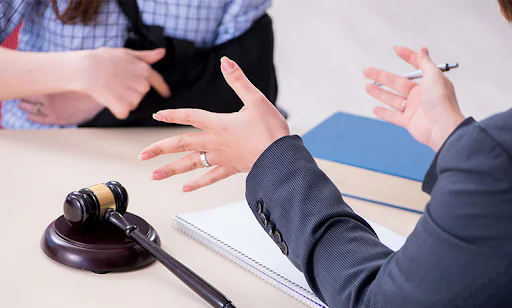Accidents can be stressful experiences and finding yourself involved can be especially trying. Understanding what one needs to do right after can greatly influence the extent to which one physically and financially bounces back from it all.

The following review provides information on what to do after a car accident and ensure that your rights are being upheld.
1. Immediate Steps at the Scene
Ensure Safety
The moment a car accident has occurred, safety should always be a priority. Ensure you and any passengers are not injured; if so, safely remove your vehicle from traffic to avoid causing further accidents.
Check for Injuries
Quickly assess the situation for any injuries to yourself or other participants involved, and call 911 immediately should there be any. If injuries do exist, medical assistance will need to be sought immediately.
Emergency Services Should Always Be Called
Even in minor accidents, calling emergency services is key to having an event documented properly and creating an official accident report which is key for both insurance claims and legal matters.
Move to a Safe Location if Possible
If possible and safe, move vehicles away from the roadside in an effort to prevent additional collisions while making accessing the scene easier for emergency responders. This may help avoid additional mishaps.
Exchanging Information
Exchange contact and vehicle details with all drivers involved, collecting names, addresses, phone numbers, insurance details and vehicle details as a matter of courtesy while remaining polite but refraining from discussing fault.
Collect Evidence
Take photographs or videos of the accident scene, vehicle damage and any visible injuries as well as gathering contact info from witnesses who saw what occurred – this evidence will support both your insurance claim and any possible legal proceedings that may follow.
2. Reporting the Accident
Reach Out to the Police
Even minor accidents require reporting to the authorities for official documentation of what occurred and can provide invaluable evidence that will assist when dealing with insurance and legal matters.
Notify Your Insurance Company
Report the accident immediately to the insurer and pass on to them any information that was gathered when the accident occurred as well as police and medical reports.
3. Medical Attention
Seek Medical Attention Promptly
Even if you feel fine, some injuries may not be immediately obvious. Adrenaline may help mask discomfort; and conditions like whiplash or internal injuries might only become evident later.
Document Injuries and Treatments
Be sure to maintain detailed records of any injuries sustained and treatments received, medical visits attended to, prescribed medications taken or medical procedures conducted, should the need arise for filing a personal injury claim. This documentation could prove vitally important if filing is ever necessary.
4. Legal Considerations
Understand Your Rights
Understanding your legal rights is essential – especially if the accident was not your responsibility. In such a case, compensation can be claimed from those responsible.
Consult a Car Accident Lawyer
Consult with a car accident attorney as soon as you notice significant damages or injuries after an auto accident has taken place to help navigate through any complexities in your case and ensure fair compensation is awarded.
5. Insurance Process
Notify the insurance provider of the party responsible and file a claim on their behalf, including providing them with all of the relevant paperwork (police report and scene footage) which was gathered from your accident scene. Review your own policy to understand its coverage.
Maintain Complete Records of Interactions
Keep detailed records of every interaction with insurance companies, such as dates, times, and names of representatives that you interacted with. Doing this may help resolve any disputes that arise more easily.
6. Financial Implications
Document all Expenses
This documentation will support any compensation claims you file.
Understanding Your Rights
Speak to an attorney about all your compensation rights related to an accident. This should include both immediate costs and future expenses associated with it.
Potential Settlement or Lawsuit
Most car accident claims can be settled out-of-court; however, be prepared for a lawsuit in case a fair settlement cannot be achieved. Your attorney will assist with this process.
FAQs
If A Car Accident Is Not Your Fault, Does Your Insurance Go Up?
Even if you are not responsible for the car accident, your insurance costs can rise. It depends on the particular insurance company and how it deals with risk factors and their insurance policies. While some companies can allow you to get accident forgiveness especially if it is your first accident, others can increase your rates especially if the company in question has deduced that you qualify for being a high-risk driver after the accident.
What to Do After A Car Accident Not Your Fault Progressive?
In case your car is involved in an accident especially if it was as a result of a negligence of the other party, Progressive gives a tip that one should gather some information of the other driver, take some photographs and lastly inform the police.
Finally, it is essential to inform the insurer and make a claim as a culprit or witness of the accident. It will help in handling the insurer of the negligent party and even make claims for any losses based on your policy.
Why Do I Have to Go to Court After A Car Accident?
Going to court may become necessary following an auto collision when there’s disagreement as to who caused the incident and/or damages or injuries are substantial enough. Also involving courts can help ensure fair resolution is reached if legal action needs to be pursued for compensation claims.
Do I Need A Lawyer After A Car Accident?
Consulting with an attorney immediately following any car accident is advised, particularly if there are injuries, extensive property damage or issues with assigning fault. A legal advisor can assist in managing the claims process with insurance companies as well as making sure you receive fair compensation for losses suffered during an incident – even when seemingly straightforward accidents take place.
Conclusion
Experiencing a car accident which one has no control of is among shocking incidents that a person can ever endure. If you adhere to the precise instructions above, you will be able to uphold your rights, guarantee safety, and address any insurance or legal concerns related to the accident recovery.
Consult a professional lawyer and a qualified doctor as soon as possible.











